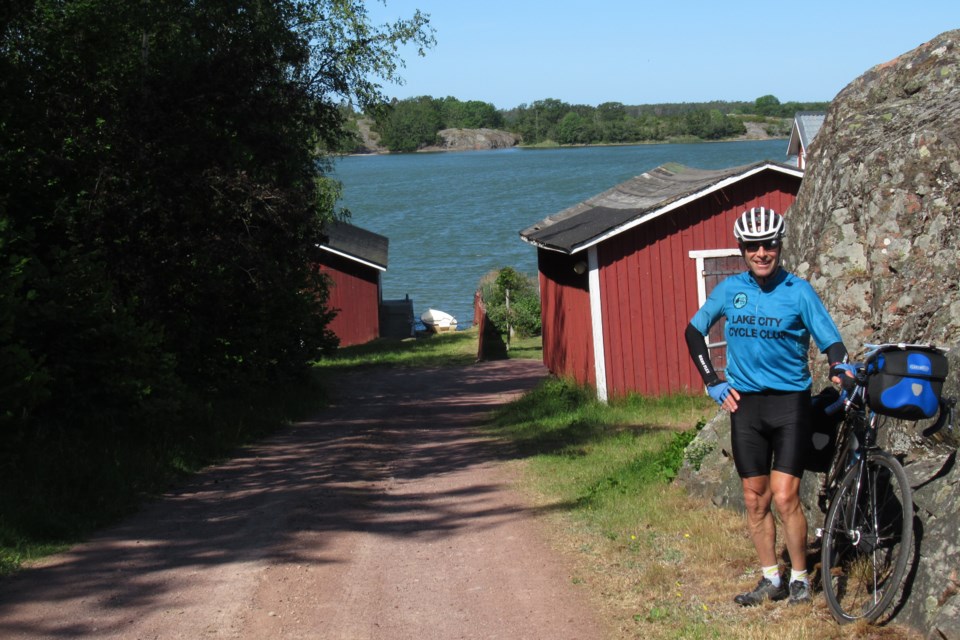The shoreside dirt road where Thomas DeMarco pulled over to snap a photo in Mariehamm—the quaint capital of Åland, an autonomous archipelago off the coast of Finland—was picturesque, but it wasn’t the view of the Baltic Sea that prompted him to hop off his bike.
The longtime Whistler doctor instead paused his ride on June 24 to commemorate the spot where he officially reached a major milestone: 400,000 total kilometres cycled in his lifetime. About three weeks earlier, during a visit to the Netherlands on June 2, DeMarco also celebrated reaching 100,000 lifetime kilometres cycled in Europe.
“Every time I leave for a bike trip, people tend to ask me, you know, ‘How far are you going to ride?’ And I always say, ‘I don’t know. I record it, but I don’t have any objectives in terms of distance, so I’ll tell you when I get back,’” said DeMarco. “This is the one time when nobody asked me that question, and the one time when I did actually have objectives.”
In addition to his goal of reaching the six-figure milestones, DeMarco flew overseas with a third distance-related target: to ride 3,000 kilometres in a calendar month. “This is a rare time I thought, ‘I want to do all three of those things in the month of June,’ so I did,” DeMarco said.
He clocked the significant milestones while cycling from Amsterdam to Stockholm last month. The trip, which took place from June 1 to 26, also brought DeMarco’s tally of European countries ridden in to 46.
“It was one of my favourite rides in a long time in Europe, because those are really all of the most bicycle-friendly countries in the world—the Netherlands, Germany, Denmark, Norway, Sweden; these are all countries where bicycling is a normal form of transportation rather than some alternative form of transportation or recreation,” said DeMarco.
The family physician’s lifetime kilometre count is now equivalent to circumnavigating Earth at its equator 10 times, and is further than the 384,400 km separating Earth and the moon. Broken down, DeMarco’s tally represents biking an average of 20 kilometres every day for the 54 years he’s been keeping track.
DeMarco has recorded his bike distances with pen, paper and an odometer since he started delivering papers as a teen in Ontario’s Essex County. He makes a point of tabulating the total distances on his odometers after each trip, and at the end of each year.
Beyond his paper route, “I always wanted to know what was beyond the next intersection; around the next bend; over the next river,” DeMarco recalled. “I’ve just had this curiosity all my life—I’m always looking for new roads.”
Naturally, when his sister started taking cycling trips to Europe in the late ’70s, DeMarco was inspired to join in. “It was just as good as I thought it would be, so I’ve kept on doing it ever since,” he explained. The locums he recruits to cover his practice have allowed DeMarco to continue taking multi-week bike trips throughout his last 27 years working as a physician in Whistler.
Closer to home, DeMarco can usually be found on his bike almost every day of the year. “I think my longest streak ever was 400 days in a row,” he said. “The cold never stops me, but occasionally the snow is too deep and I have to ski or walk rather than ride.”
DeMarco’s decades of globe-spanning bike travels are memorialized in marked-up route maps and photos covering the walls of his Whistler garage.
Though he’s cycled extensively through North America, Australia, Morocco and a few countries in Asia, a map of the Lower Mainland is particularly difficult to read through Sharpie ink. DeMarco said he’s cycled every street in Vancouver, Burnaby, New Westminster and Richmond, despite having never called any of those communities home.
Reflecting on the hundreds of thousands of kilometres he’s ridden, DeMarco emphasized the enrichment and satisfaction he finds in active, self-powered travel.
“I think hiking and paddle trips are also excellent examples of that—it doesn’t have to be a bicycle—but it’s just so much more rewarding than the passivity of driving,” he said. “Of course, it’s not necessarily either or, you can combine different modes, whether it be driving or buses or trains. I would encourage people to broaden their horizons a little bit and not immediately associate all travel with a car. There certainly are other means that are not only more environmentally friendly, but also more rewarding.”




